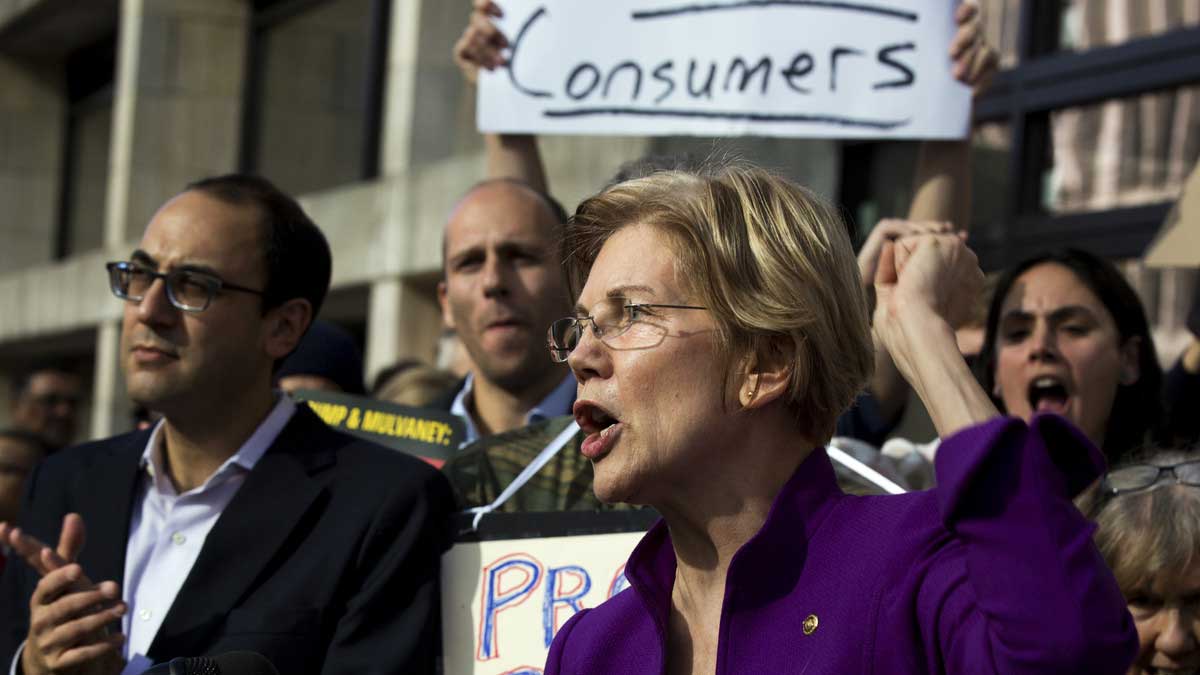- Home
- Billionaires
- Investing Newsletters
- 193CC 1000
- Article Layout 2
- Article Layout 3
- Article Layout 4
- Article Layout 5
- Article Layout 6
- Article Layout 7
- Article Layout 8
- Article Layout 9
- Article Layout 10
- Article Layout 11
- Article Layout 12
- Article Layout 13
- Article Layout 14
- Article Sidebar
- Post Format
- pages
- Archive Layouts
- Post Gallery
- Post Video Background
- Post Review
- Sponsored Post
- Leadership
- Business
- Money
- Small Business
- Innovation
- Shop
Recent Posts
Elon Musk Targets CFPB in Government Overhaul Push

Elon Musk, Earth’s wealthiest individual and the President-Elect Donald Trump’s designated czar for government efficiency, has set his sights on a new federal agency: the Consumer Financial Protection Bureau (CFPB). Musk, who has been outspoken about reducing government expenditures and streamlining regulatory bodies, took to his social media platform X early Wednesday morning to post a simple yet direct message: “Delete CFPB.” This statement is Musk’s latest move in his broader campaign to reduce the size and scope of federal agencies, particularly those he deems unnecessary or duplicative.
The CFPB, established in the aftermath of the 2008 financial crisis, is tasked with overseeing financial products and services aimed at consumers, ensuring that they are fair, transparent, and competitive. The agency primarily targets financial institutions involved in activities such as credit card and payment processing. Musk’s call for the agency’s elimination aligns with his broader stance on reducing government intervention in business and financial markets. His criticisms reflect growing sentiments among some conservatives and business leaders who see the CFPB as an impediment to economic growth and innovation.
Musk’s post, which has garnered significant attention, comes in the wake of a podcast discussion featuring Marc Andreessen, the billionaire venture capitalist and a notable Trump donor. Andreessen, in his conversation, claimed that the CFPB’s primary function is to “terrorize financial institutions,” suggesting that the agency’s regulatory actions often have detrimental effects on businesses. Musk echoed this sentiment, adding that the federal government is burdened with too many regulatory bodies. His comments are in line with his appointment earlier this month to co-lead the newly formed “Department of Government Efficiency,” a commission designed to reduce federal spending and workforce, an initiative championed by Trump.
This latest post is not just a casual remark by Musk; it reflects his long-standing belief in reducing government inefficiency. The idea of cutting back on federal agencies is a key aspect of Project 2025, an ambitious agenda crafted by the conservative think tank Heritage Foundation, which has been heavily influenced by Trump’s incoming administration. The document dedicates a significant portion of its focus to the CFPB, urging Congress to abolish the agency altogether. According to the Heritage Foundation, the CFPB is a “highly politicized” entity that functions without sufficient accountability, and its existence only serves to add layers of complexity to the regulatory landscape.
Musk’s critique of the CFPB also highlights a deeper ideological divide over the role of government in regulating financial markets. On one side, proponents of the CFPB, including Democratic leaders and consumer advocacy groups, argue that the agency is essential for protecting consumers from abusive practices in the financial sector. In contrast, critics like Musk and Andreessen contend that such oversight stifles innovation and economic growth by burdening companies with excessive regulation.
The CFPB was created as part of the Dodd-Frank Wall Street Reform and Consumer Protection Act, which aimed to overhaul financial regulations in response to the 2008 financial crisis. The agency’s creation was largely driven by the efforts of Senator Elizabeth Warren (D-Mass.), who championed the idea of a “Financial Product Safety Commission” back in 2007. Warren’s vision for the agency was to give consumers a powerful voice in the financial system, ensuring that they were not taken advantage of by predatory lending practices or opaque financial products.
Since its creation, the CFPB has been responsible for returning approximately $20 billion in consumer relief, focusing on practices such as deceptive marketing and high-interest rates that disproportionately affect low-income families. However, its activities have made it a target of conservative lawmakers, who argue that its enforcement actions can be too aggressive and often overstep its mandate.
Despite the growing calls for its dissolution, supporters of the CFPB, including Warren, have consistently defended the agency’s role in protecting consumers. Last week, Warren responded to the mounting pressure to eliminate the agency by asserting, “The CFPB is here to stay. There’s big talk, but the laws supporting the CFPB are strong.” Warren’s statement underscores the resilience of the agency, which has garnered substantial legal and political support from Democrats, particularly those who view the CFPB as an essential part of a fair and equitable financial system.
Musk’s attack on the CFPB is part of a broader effort to reduce the size of the federal government. His plans focus on cutting more than 75% of the government’s over 400 agencies, with a particular emphasis on those involved in regulation. In addition to the CFPB, Musk has expressed a desire to scale back agencies like the Federal Trade Commission (FTC) and the Securities and Exchange Commission (SEC), both of which play crucial roles in overseeing business practices and financial markets. Musk’s push for efficiency is grounded in his belief that reducing government intervention will allow businesses to thrive and foster innovation.
At the heart of Musk’s argument is the notion that excessive government regulation stifles economic progress. As someone who has built a multi-billion-dollar empire spanning industries like electric vehicles, space exploration, and social media, Musk has firsthand experience with the challenges of navigating complex regulatory environments. His comments reflect his broader philosophy that government should play a minimal role in business operations, particularly when it comes to financial institutions.
Despite the growing momentum behind efforts to limit the CFPB’s power, the agency remains a significant force in the financial world. With a budget of roughly $760 million for the 2024 fiscal year, the CFPB continues to wield considerable influence over financial institutions, which must comply with its regulations to avoid penalties and enforcement actions.
In conclusion, Elon Musk’s call to “delete” the CFPB is emblematic of his broader vision for a streamlined, more efficient government. As the wealthiest person on Earth and a leading figure in the tech industry, Musk’s views on regulation are likely to carry weight in the coming years, particularly as Trump’s administration looks to reshape the federal bureaucracy. Whether the CFPB will survive the growing pressure to dismantle it remains to be seen, but one thing is clear: Musk’s stance on government regulation will continue to shape the national debate on financial oversight for years to come.
Recent Posts
Categories
- 193 Countries Consortium Partner1
- 193cc Digital Assets2
- 5G1
- Aerospace & Defense48
- AI37
- Arts3
- Banking & Insurance11
- Big Data3
- Billionaires1,261
- Boats & Planes1
- Business332
- Careers13
- Cars & Bikes79
- CEO Network1
- CFO Network17
- CHRO Network1
- CIO Network1
- Cloud10
- CMO Network18
- Commercial Real Estate7
- Consultant1
- Consumer Tech194
- CxO1
- Cybersecurity73
- Dining1
- Diversity, Equity & Inclusion4
- Education7
- Energy8
- Enterprise Tech29
- Events11
- Fintech1
- Food & Drink2
- Franchises1
- Freelance1
- Future Of Work2
- Games149
- GIG1
- Healthcare79
- Hollywood & Entertainment203
- Houses1
- India’s 1000 Richest1
- Innovation46
- Investing2
- Investing Newsletters4
- Leadership65
- Lifestyle11
- Manufacturing1
- Markets20
- Media327
- Mobile phone1
- Money13
- Personal Finance2
- Policy569
- Real Estate1
- Research6
- Retail1
- Retirement1
- Small Business1
- SportsMoney42
- Style & Beauty1
- Success Income1
- Taxes2
- Travel10
- Uncategorized13
- Vices1
- Watches & Jewelry2
- world's billionaires1,230
- Worlds Richest Self-Made Women2
Related Articles
South Korea Plane Crash: A Tragic Loss and Global Mourning
The tragic plane crash at South Korea’s Muan International Airport on Sunday...
By 193cc Agency CouncilDecember 30, 2024H-1B Visa Debate Splits Trump Allies and Silicon Valley
The debate over H-1B visas has once again become a contentious issue,...
By 193cc Agency CouncilDecember 28, 2024Trump Moves $4B Stake in Truth Social Parent, Stock Drops 6%
Donald Trump recently transferred his 57% stake in Trump Media & Technology...
By 193cc Agency CouncilDecember 20, 2024House Rejects Trump-Backed Funding Bill, Shutdown Looms
The U.S. House of Representatives rejected a new government funding bill on...
By 193cc Agency CouncilDecember 20, 2024















Leave a comment